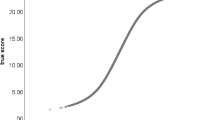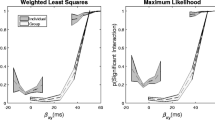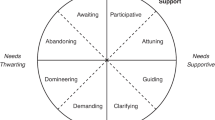Abstract
The concept of metacontingency describes a contingent relation between the coordination of two or more individual’s behavior and a selecting consequence. The concept provides several insightful avenues for experimental investigation of social behavior and behavior of people in groups. The present study explores the question of whether operant behavior of individuals and coordinated behavior of multiple individuals can be distinguished as two different conditionable units of analysis. We used rates of individual responding maintained by ratio or interval schedules of reinforcement as a baseline to evaluate the effect of consequences contingent on coordinated behavior of 27 participants in groups of three. Coordination demanded temporal spacing between responses of three participants superimposed on the variable interval or variable ratio individual reinforcement schedules. The results showed that contingency on coordinated behaviors resulted in an increased rate of coordination along with a decreased rate of responding to individual schedules. Interresponse times (IRTs) from all participants were sensitive to the coordination contingency. We discuss the need to distinguish units of analysis that describe individual behavior and units describing coordinated behavior, although these units may occur simultaneously.




Similar content being viewed by others
Data Availability
Data are available as Supplementary Material.
Notes
In effect, we programmed second order schedules FR 10 (VI 6 s) and FR 10 (VR 2).
References
Azrin, N. H., & Lindsley, O. R. (1956). The reinforcement of cooperation between children. Journal of Abnormal and Social Psychology, 52, 100–102. https://doi.org/10.1037/h0042490
Baia, F. H., & Sampaio, A. A. S. (2019). Distinguishing units of analysis, procedures, and processes in cultural selection: Notes on metacontingency terminology. Behavior & Social Issues, 28, 204–220. https://doi.org/10.1007/s42822-019-00017-8
Baum, W. (2010). Dynamics of choice: A tutorial. Journal of the Experimental Analysis of Behavior, 94, 161–174. https://doi.org/10.1901/jeab.2010.94-161
Cavalcanti, D. E., Leite, F. L., & Tourinho, E. Z. (2014). Seleção de práticas culturais complexas: Avaliação experimental de um análogo do procedimento de aproximação sucessiva [The selection of complex cultural practices: Experimental assessment of an analogue of the successive approximation procedure]. Psicologia e Saber Social, 3, 2–21. https://doi.org/10.12957/psi.saber.soc.2014.12199
Cihon, T. M., Borba, A., Lopez, C. R., Kazaoka, K., & de Carvalho, L. C. (2020). Experimental analysis in culturo-behavior science: The search for basic processes. In T. M. Cihon & M. A. Mattaini (Eds.), Behavior analysis: Theory, research, and practice. Springer. https://doi.org/10.1007/978-3-030-45421-0_6
Cohen, D., & Lindsley, O. R. (1964). Catalysis of controlled leadership in cooperation by human stimulation. Journal of Child Psychological Psychiatry & Allied Disciplines, 5, 119–137. https://doi.org/10.1111/j.1469-7610.1964.tb02134.x
de Carvalho, L. C., Couto, K., Gois, N., Sandaker, I., & Todorov, J. C. (2016). Evaluating effects of cultural consequences on the variability of interlocking behavioral contingencies and their aggregate products. European Journal of Behavior Analysis, 18, 84–98. https://doi.org/10.1080/15021149.2016.1231003
de Carvalho, L. C., dos Santos, L., Regaço, A., Barbosa, T. B., Silva, R. F., de Souza, D. G., & Sandaker, I. (2018). Cooperative responding in rats maintained by fixed- and variable-ratio schedules. Journal of the Experimental Analysis of Behavior, 110, 105–126. https://doi.org/10.1002/jeab.457
de Carvalho, L. C., dos Santos, L., Regaço, A., & de Souza, D. G. (2019). Effects of response-reinforcer relations on the maintenance of coordinated responding under schedules of simultaneous reinforcement. Mexican Journal of Behavior Analysis, 45, 382–397. https://doi.org/10.5514/rmac.v45.i2.75573
de Carvalho, L. C., dos Santos, L., Regaço, A., Couto, K. C., de Souza, D. G., & Todorov, J. C. (2020). Cooperative responding in rats: II. Performance on fixed-ratio schedules of mutual reinforcement. Journal of the Experimental Analysis of Behavior, 114, 291–307. https://doi.org/10.1002/jeab.628
de Toledo, T. F. N., & Benvenuti, M. F. L. (2015). Efeitos da exigência de desempenhos entrelaçados sobre linha de base em esquema simples de reforço [Effects of a demand for interlocking performances over baseline in simple schedules of reinforcement]. Revista Brasileira de Análise Do Comportamento, 11, 184–194. https://doi.org/10.18542/rebac.v11i2.1971
de Toledo, T. F. N., Benvenuti, M. F. L., Sampaio, A. A. S., Marques, N. S., Cabral, P. A., Araújo, L. A. S., Machado, L. R., & Moreira, L. R. (2015). Free culturant: a software for the experimental study of behavioral and cultural selection. Psychology & Neuroscience, 8, 366–384. https://doi.org/10.1037/pne0000016
Epanechnikov, V. A. (1969). Non-parametric estimation of a multivariate probability density. Theory of Probability & Its Applications, 14, 153–158.
Glenn, S. S. (2004). Individual behavior, culture, and social change. Behavior Analyst, 27, 133–151. https://doi.org/10.1007/BF03393175
Glenn, S. S., Malott, M. E., Andery, M. A. P. A., Benvenuti, M., Houmanfar, R. A., Sandaker, I., Todorov, J. C., Tourinho, E. Z., & Vasconcelos, L. A. (2016). Toward consistent terminology in a behaviorist approach to cultural analysis. Behavior & Social Issues, 25, 11–27. https://doi.org/10.5210/bsi.v25i0.6634
Herrnstein, R. J. (1961). Relative and absolute strength of response as a function of frequency of reinforcement. Journal of the Experimental Analysis of Behavior, 4, 267–272.
Hunter, C. S. (2012). Analyzing behavioral and cultural selection contingencies. Revista Latinoamericana de Psicología, 44, 43–54 Retrieved from http://www.scielo.org.co/pdf/rlps/v44n1/v44n1a05.pdf.
Krispin, J. V. (2016). What is the metacontingency? Deconstructing claims of emergency and cultural-level selection. Behavior & Social Issues, 25, 28–41. https://doi.org/10.5210/bsi.v25i0.6186
Kuroda, T. (2019). Reinforcement of approaching conspecific in zebrafish (Danio Rerio) using a real-time 3D tracking system. Revista Mexicana de Análisis de la Conducta, 45, 359–381. https://doi.org/10.5514/rmac.v45.i2.75572
Marques, N. S., & Tourinho, E. Z. (2015). The selection of cultural units by non-contingent cultural events. Behavior & Social Issues, 24, 126–140. https://doi.org/10.5210/bsi.v24i0.4283
Marr, M. J. (2006). Behavior analysis and social dynamics: Some questions and concerns. Behavior & Social Issues, 15, 57–67. https://doi.org/10.5210/bsi.v15i1.345
Pavanelli, S., Leite, F. L., & Tourinho, E. Z. (2014). A “modelagem” de contingências comportamentais [The shaping of complex interlocking behavioral contingencies]. Acta Comportamentalia, 22, 425–440.
Perone, M. (1991). Experimental design in the analysis of free-operant behavior. In I. H. Iversen & K. A. Lattal (Eds.), Experimental Analysis of Behavior, Parts 1 & 2 (pp. 135–171). Elsevier Science.
Saconatto, A. T., & Andery, M. A. P. A. (2013). Seleção por metacontingências: Um análogo experimental de reforçamento negativo [Selection by metcontingencies: An experimental analogue of negative reinforcement]. Interação Em Psicologia, 17, 1–10. https://doi.org/10.5380/psi.v17i1.26779
Sampaio, A. A. S., Araújo, L. A. S., Gonçalo, M. E., Ferraz, J. C., Alves Filho, A. P., Brito, I. S., Barros, N. M., & Calado, J. I. F. (2013). Exploring the role of verbal behavior in a new experimental task for the study of metacontingencies. Behavior & Social Issues, 22, 87–101. https://doi.org/10.5210/bsi.v.22i0.4180
Schmitt, D. R. (1998). Social behavior. In K. A. Lattal & M. Perone (Eds.), Handbook of research methods in human operant behavior (pp. 471–505). Plenum Press. https://doi.org/10.1007/978-1-4899-1947-2_15
Schmitt, D. R., & Marwell, G. (1968). Stimulus control in the experimental study of cooperation. Journal of the Experimental Analysis of Behavior, 11, 571–574. https://doi.org/10.1901/jeab.1968.11-571
Skinner, B. F. (1938). Behavior of organisms. Appleton & Company.
Skinner, B. F. (1962). Two synthetic social relations. Journal of the Experimental Analysis of Behavior, 5, 531–533. https://doi.org/10.1901/jeab.1962.5-531
Tadaiesky, L. T., & Tourinho, E. Z. (2012). Effects of support consequences and cultural consequences on the selection of interlocking behavioral contingencies. Revista Latinoamericana de Psicología, 44, 133–147.
Tan, L., & Hackenberg, T. D. (2016). Functional analysis of mutual behavior in laboratory rats. Journal of Comparative Psychology, 130, 13–23. https://doi.org/10.1037/com0000015
Vasconcelos, I., & Todorov, J. C. (2015). Experimental analysis of the behavior of persons in groups: selection of an aggregate product in a metacontingency. Behavior and Social Issues, 24, 111–125. https://doi.org/10.5210/bsi.v24i0.5424
Velasco, S. M., Benvenuti, M. F. L., Sampaio, A. A. S., & Tomanari, G. Y. (2017). Cooperation and Metacontingency in Pigeons. Psychological Record, 67, 537–545. https://doi.org/10.1007/s40732-017-0256-x
Vichi, C., Andery, M. A. P. A., & Glenn, S. S. (2009). A metacontingency experiment: the effects of contingent consequences on patterns of interlocking contingencies reinforcement. Behavior and Social Issues, 18, 1–17. https://doi.org/10.5210/bsi.v18i1.2292
Zeiler, M. D. (1977). Schedules of reinforcement. Em W.K. Honig & J.E.R. Staddon (Eds.), Handbook of operant behavior (pp. 201-232). New Jersey: Prentice-Hall.
Zilio, D. (2019). On the function of science: an overview of 30 years of publications on metacontingency. Behavior and Social Issues, 28, 46–76. https://doi.org/10.1007/s42822-019-00006-x
Funding
The research was funded by the Research Support by Fundação de Amparo à Pesquisa do Estado do Mato Grosso (FAPEMAT) to Thais Ferro de Nogara de Toledo.
Marcelo Benvenuti is member of Instituto Nacional de Ciência e Tecnologia sobre Comportamento, Cognição e Ensino [National Institute of Science and Technology on Behavior, Cognition, and Teaching], supported by FAPESP (grant no. 08/57705-8) and CNPq (grant no. 573972/2008-7).
Author information
Authors and Affiliations
Corresponding author
Ethics declarations
Consent
Before starting the experiment, all of the participants read and signed a Consent Form approved by the Institutional Review Board (IRB) of the University of São Paulo Institute of Psychology (no. 471.795) and by the IRB of the Federal University of Mato Grosso (no. 488.187).
Conflict of Interest
On behalf of all authors, the corresponding author states that there is no conflict of interest.
Additional information
Publisher’s Note
Springer Nature remains neutral with regard to jurisdictional claims in published maps and institutional affiliations.
The authors thank Deisy das Graças de Souza, Lucas Couto de Carvalho and Julio Camargo for their helpful comments and suggestions.
Rights and permissions
About this article
Cite this article
de Toledo, T.F.N., Benvenuti, M.F.L., Marques, N.S. et al. Schedule Performance as a Baseline for the Experimental Analysis of Coordinated Behavior: Same or Different Units of Analysis?. Psychol Rec 72, 185–195 (2022). https://doi.org/10.1007/s40732-022-00510-4
Accepted:
Published:
Issue Date:
DOI: https://doi.org/10.1007/s40732-022-00510-4




